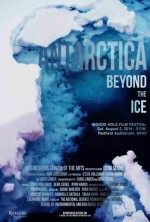The 24th Annual Woods Hole Film Festival in Falmouth Massachusetts had a sold out crowd during a 70 minute preview screening of a unique documentary narrative funded by the National Science Foundation entitled ‘Antarctica: Beyond the Ice’.
A year in the making, the interdisciplinary project combines science and art while capitalizing on the iconic imagery of the Western Antarctic Peninsula (WAP). Chronicling the story is biological oceanographer Oscar Schofield from Rutgers University, depicting over two decades of innovative research from the Palmer (PAL) Long Term Ecological Research (LTER) program. The film highlights many of the Palmer scientists who are driven to explore, document and understand the changes the ecosystem is undergoing.
The project creatively integrates several broad outreach strategies to communicate the science to the general public including a feature film, website, a blog, and short educational pieces intended for classroom and web-based learning. PAL LTER Education and Outreach coordinator, Beth Simmons, and two teachers on a Research Experience for Teachers (RET) project are working to integrate the pieces into an AntarcTECH science curriculum for the STEM Academy in Sandwich, Massachusetts.
The production is the brainchild of Dena Seidel, the film’s director, producer and co-cinematographer as well as the director of the Rutgers Center for Digital Filmmaking. Photographer and scientist Chris Linder was the film’s cinematographer and co-field producer. Professor Seidel involved fourteen undergraduate students in all aspects of the editing, interviewing and post- production process, allowing them to develop their professional skills as science communicators. Seidel encouraged several of the students to participate in round-table discussions following the Woods Hole screening.
Several of the students commented on how working on the film had a dramatic impact on their learning and their potential careers in film production, science communication, and visual arts. Since none of the students were science majors, this experience provided them with an opportunity to consider science from a new perspective, positively developing their science identities and improving their abilities to engage confidently in scientific discussions.

 Enlarge this image
Enlarge this image